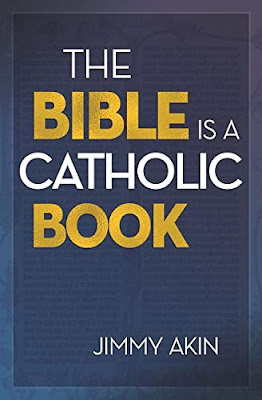When Akin addresses a topic, no matter how well you have seen it covered in the past, he can be trusted to come at it from a slightly different angle, with data you have yet to unearth. In this book, instead of diving straight into the composition history of the biblical texts and the development of the canon, Akin takes us back to the beginning - actually, before the beginning - to the Second Person of the Trinity, the definitive Word of God, of Whom "all of God's other words are shadows" (p.13).
God has communicated with man since the time of his creation, tens of thousands of years ago. Only in the past five thousands years, however, since the development of writing, has it been possible for revelation to take written form. For the vast majority of man's time on earth, he has been a completely oral creature. Information, God's revelation included, came down in oral tradition, in a controlled, accurate way via tradents - authorized bearers of tradition - via techniques such as chiasm, meter, melody, and rhyme.
When Akin does begin discussing the composition of the OT and NT texts, his work is top-notch. Two quick points that jumped out at me:
- The OT speaks of authentic prophetic works - those of Ahijah the Shilonite and Iddo the Seer - that Providence, subsequently, did not allow to come down to us (2 Chronicles 9:29).
- It is false to say that God was silent for the 400 years prior to the birth of Christ.
Akin addresses a number of points that have demanded my attention over the past few years:
- Different groups within first century Judaism - the Sadducees, Pharisees, Essenes and Jews in the Diaspora - had their own set of books that they recognized as inspired.
- The oft-repeated datum that the OT canon was settled at the Council of Judaism is a scholarly myth.
- Christianity received the deuterocanonical texts - exactly as it did the rest of the Hebrew Scriptures - from its earliest Jewish members; and it did so centuries before Rabbinic Judaism definitively rejected them.
- One cannot speak of a unified biblical canon in Judaism until at least AD 200.
- The abysmal literacy rates in the first century made the vast, vast majority of believers dependent upon the oral proclamation of Scripture in the synagogue and Eucharist.
- If God had intended for the Church to operate on the principle of sola scriptura; then Christ would have sat down to pen a book or, at the very least, seen to it that the printing press was available in the apostolic age.
I love the way Akin expresses this final point:
It's easy to see why the idea of sola scriptura became popular when it did and among the people that it did. The Reformers were at least moderately well off and had new printed Bibles, and now the invention of the printing press had made the idea of everyone having his own Bible at least conceivable.
But for all prior Christian history, sola scriptura was simply an impossibility. This has doctrinal implications because God doesn't ask the impossible. Since sola scriptura had never been possible, it had never been God's plan. If it had been, God would have started the Christian age after the invention of the printing press, just as he began giving the Jewish scriptures only after the invention of writing (p.150).The man has a way with words. His discussion of how texts were composed in the first century is illuminating. I never knew at what great personal expense Paul must have produced his epistles: Even among the literate, it was common to hire a professional scribe. There was also the cost of materials, pre-publication drafts, as well as the common practice of the author retaining a copy of the work. Romans alone, with its excessive length in first century terms, would have cost Paul more than $2000 at today's rates! I was also completely taken aback to learn that in Paul's First Epistle to Timothy (5:18) he may quote from Luke's Gospel (10:7) as "scripture." (We already know that, around this same time, Peter referred to Paul's letters as such.)
The Bible Is A Catholic Book is chock-full of novel insights and solid scholarship. The portion on the Church's efforts to preserve and translate Scripture throughout the middle ages dispels a host of anti-Catholic myths. You're going to have to check that out for yourself, though; the family is calling me!

Very Nice Information Thank you keep it up Regard HDVOGO
ReplyDelete